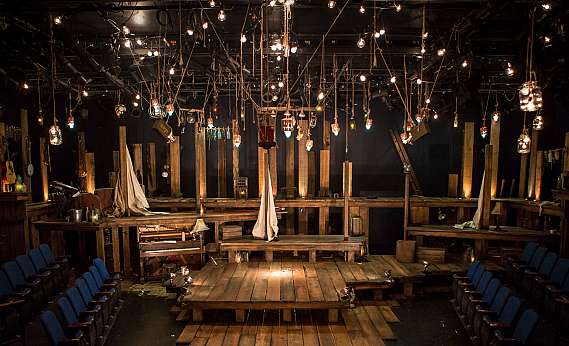The MLK Project: The Fight for Civil Rights has now been on tour for a week and a half. Each time, each audience, each place carries with it different challenges, rewards and lessons. As Community Liaison, it is my job to facilitate the entire experience for the students and teachers. Part of this entails the post-show dialogue. It is my belief that the discussion that happens after the play is just as vital as the show and it is the hope of Writers’ Theatre hope that this dialogue is progressive, probing and challenging.
To be honest I came into this position with a bit of nervousness and hesitation. I have confidence in my skills as a facilitator and I believe in the programming. However, I knew it was not going to be easy. I knew I wasn’t going to be able to walk into schools and, in a twenty-minute discussion, explore the entirety of relevance of the Civil Rights Movement, or the presence of discrimination and other social problems in America today.
I have also been forced to confront my own identity in this work. I am a white woman. Many of the schools I walk into are predominantly African-American. And so I am the “other” in the room. At one school last week this was particularly apparent. When asking what students could do to help end discrimination, a girl replied something to the affect, “It will stop when they stop sending white people to talk to us about it.”
This is a challenge. And it is one that is important to be open and honest about with the community and myself. Behind it needs to be understanding. Yes, my presence when talking about the Civil Rights Movement can continue to open wounds and can continue to prompt defensiveness. But I also believe that it is important that I am in this role as an ally. It is important that students see and hear someone who is different. We progress nowhere if we tiptoe around issues, if we pretend that we have risen above problems of discrimination, or if we belief that only those with similar identities can confront today’s problems.
Our world today is still very much in need of change. This project has continued to illuminate to me that we are still living in a time of prejudice, discrimination, and hate crimes. We are living in a city that is still segregated among communities. It is my personal belief that the education system is where change must begin. And it is through progressive programming and dialogue that this will be enabled to happen.
There are no quick fixes. And change does not come easy. But it is my hope that when I leave a school after having brought The MLK Project there, at least one student has began to think differently, at least one student has opened their mind slightly wider, at least one student will leave and seek out this conversation beyond the walls of the theatre. And I do think this happens with every performance.
I want to end by sharing with you a few other comments from students in the past week. The first is from a young, white male who attended a performance at the Winnetka Women’s Day Club. He voiced aloud that his community prides itself on being open-minded and liberal; and yet prejudice still exists, everywhere, whether we chose to admit it or not. The next day at a school on the south side a sixth grade, African- American male student said that “discrimination is a global issue […] it still happens today every where […] and we can only bring peace to others, if we have peace in our own hearts.” This last comment came from a fifteen year-old African-American girl, “Young people need to be educated. They need to be able to talk about these issues openly. It is something that affects everyone, and we need to learn and talk with others and ourselves so that it can begin to be better.”
It is these voices that continue to speak to me. These words that continue to leave me hopeful. It is these words that speak to Martin Luther King’s dream.


3 Comments
Although I have not seen the production myself, my son saw it today at his school located on the South Side. He was so excited to tell me all about. It definitely sparked his interest and was the main topic of tonight’s dinner conversation.
Hi, thanks for commenting. I would love to talk with you more about the project and my thoughts as Community Liaison. If you have any questions, additional thoughts, or specific things you were confused about, please let me know and we can dialogue.
I heard about you and the wonderful job you done at an all Hispanic School. My girlfriend was so delighted that you came to that school she just had to share the details with me.
My children attend an a school that is basiclly white and my children are of African desent.
I would love to get more information about you and your project – these parents at this school “RUN IT” and they are so “white”
I would just love for you to come there and perform.
I personally dont think they’ll like that – but lets just see.